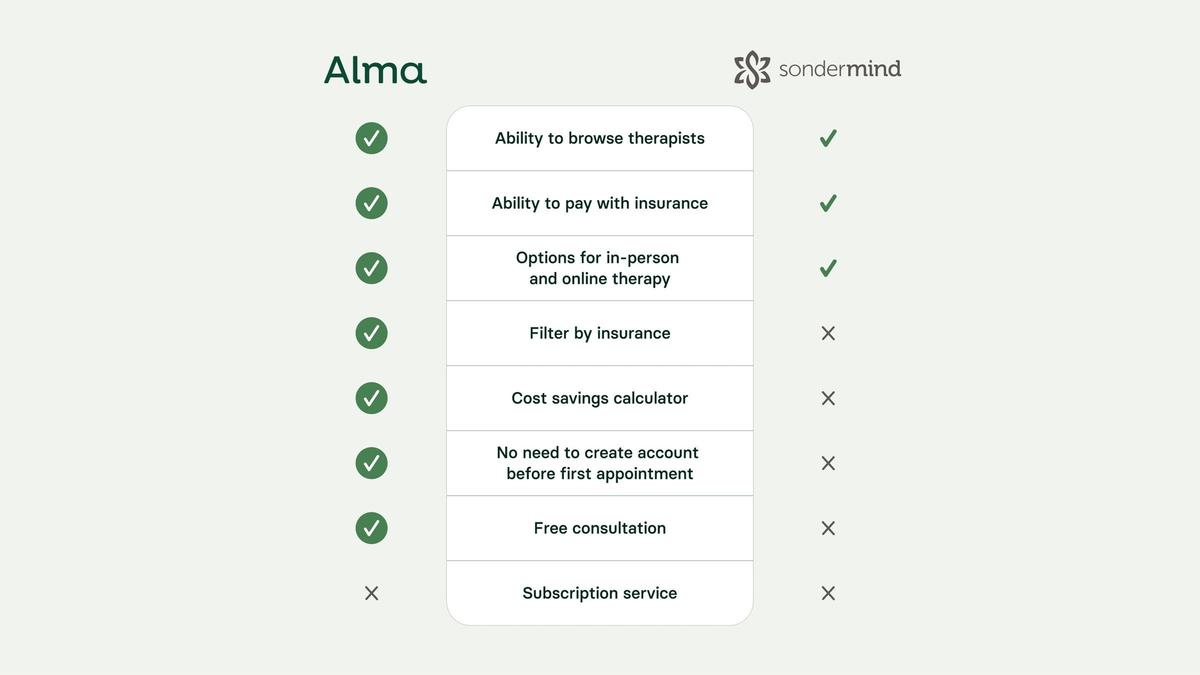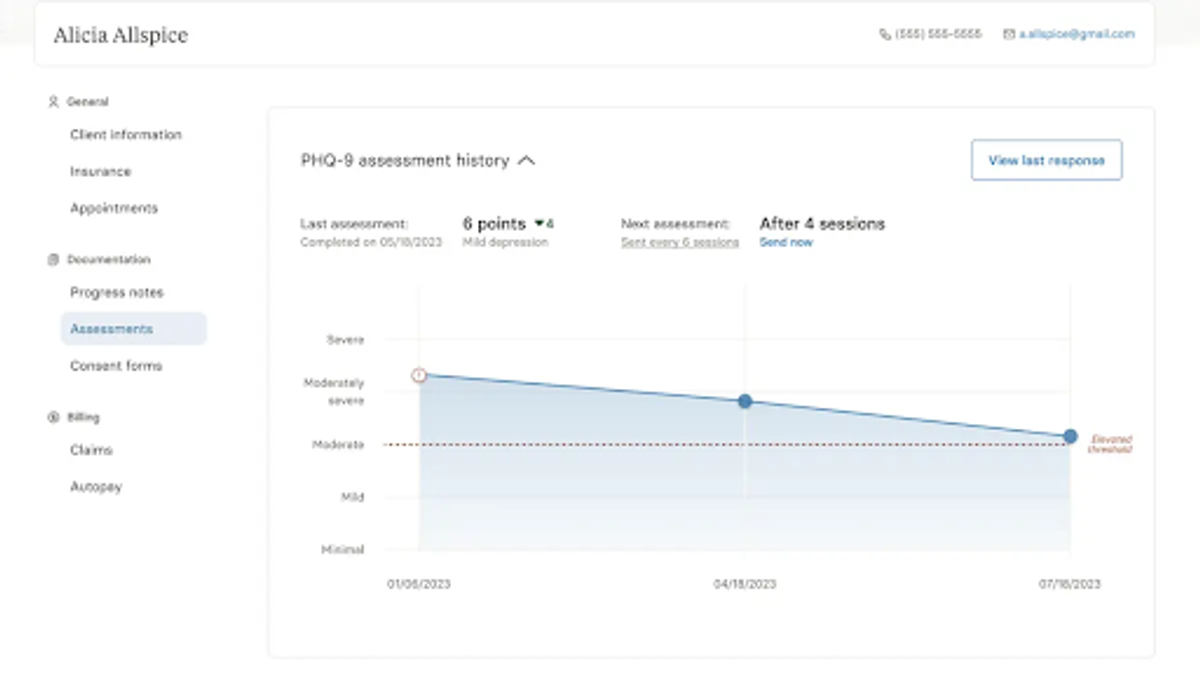
Alma vs. SonderMind: Compare Online Therapy Options
Consumers and clinicians have compared Alma and SonderMind to evaluate which online therapy platform better meets their needs.
Clinicians:
Compare Alma and SonderMind for therapists in the second half of this article.
Alma vs. SonderMind for finding a therapist
If you’re searching for a therapist online, you may have come across Alma and SonderMind. While both can help you find a provider, they have some distinct differences. Curious to know which is the better option for you? Here’s a quick feature comparison, followed by an in-depth look at how the platforms stack up.

Size of provider network
To find the right therapist for you, you want multiple options. The larger a platform’s provider network is, the higher the likelihood that you’ll find one who aligns with your needs and preferences.
Size of provider network: How do Alma and SonderMind compare?
Alma currently has a network of more than 21,000 providers in all 50 U.S. states. SonderMind has more than 10,000 providers in 45 states and Washington, D.C. Though both platforms continue to grow, this difference means it’s more likely that you’ll find a provider who fits all of your preferences on Alma.
Provider search
Searching for a provider is a different experience on each platform. Some give you the freedom to use filters and narrow down your options, while others take a more guided approach, asking questions to create a list of therapists that best suit your needs. People looking for a more personalized process often prefer guided searches.
Provider search: How do Alma and SonderMind compare?
Alma gives you the option to browse its directory or receive a list of matches by answering a few questions.
If you start by browsing the directory, you select the service you’re looking for, your location, your insurance (or if you’ll pay out of pocket), and whether you’re looking for virtual or in-person therapy.
Once you receive your initial page of results, you can filter those results by:
- Provider identity
- Specialty
- Session availability
- Language
- Therapeutic approach
If you want to get more specific, you can click on “more filters” and select:
- Degree type
- Ages served
- Only show providers who offer sliding scale feels (if you’re going to pay for therapy without insurance)
One helpful Alma feature is the descriptions embedded within the search functions. For example, under “degree type”, Alma explains what kind of training that professional has. And under “therapeutic approach”, you can explore straightforward definitions of types of therapy.
If you choose “help me find care”, Alma guides you through eight to 10 questions about what you’re looking for in a therapist, including therapeutic approach and demographic information, as well as what you want to focus on with your provider. The guided approach is especially useful if you’d like a helping hand figuring out what you’re looking for in a therapist.
With either search option, Alma generates a list of providers who match your criteria that you can then browse. You don’t need to create an account to access this information.
SonderMind only matches users with therapists through a short questionnaire (fewer than 10 questions). If SonderMind is available in your state, you answer what brought you to SonderMind today, with options including “I’m feeling down or depressed”, “I want general support”, and “I need guidance finding the right medication.”
Next, you choose whether you’re open to video sessions and what time of day you prefer. Then SonderMind asks whether you prefer a therapist of a certain gender and if you have any other preferences, including the therapist’s specialties, race or ethnicity, age, or sexuality. Rather than clicking these options, SonderMind prompts you to add any additional preferences in a free text box.
After this, you select how you’ll pay for therapy and, if you’ll use insurance, choose which one you have. Lastly, you enter your name and contact information.
Overall, the search experiences on Alma and SonderMind are similar, though Alma provides more specific prompts. This may help people who don’t know all of the different topics that therapists may specialize in or who desire a certain therapeutic approach.
Provider profiles
The next step can feel like a moment of truth: Will the providers you’re paired with fulfill your expectations? Having therapist profiles can help greatly—you get to see a face and a detailed bio so you can get a sense of what they’d be like to work with.
Provider profiles: How do Alma and SonderMind compare?
With Alma, once you have your list of therapists who meet your criteria, you can browse their profiles. Most answer questions to help clients get to know them better—some share why they got into therapy and what to expect from a session with them. You can also get an estimate of how much you would pay per session.
SonderMind also has provider profiles, but you can only access this with an account. Once you complete the questionnaire, SonderMind emails you a link to set up your account. When you do, you can view a list of providers who match your criteria. Each profile includes a self-written biography as well as their specialities, treatment approaches, insurances accepted, and licensure.
In the end, although both Alma and SonderMind have provider profiles, Alma wins here because it allows you access to this detailed information without having to create an account.
Consultations
Therapy is often a place where you reveal things you wouldn’t to anyone else. It’s no surprise, then, that many people want a preview of what it would be like working with a specific therapist before they commit to spilling the tea. This is where a consultation can be huge. These short sessions are often free. While it takes extra effort, having consultations with several providers can give you the chance to compare your options and decide which therapist is right for you.
Consultations: How do Alma and SonderMind compare?
Most Alma providers allow you to book a free consultation before starting therapy from within the therapist’s profile.
SonderMind doesn’t offer free consultations. Users select a therapist and start with their first session.
Pricing
Most people would prefer not to pay out-of-pocket for therapy. For people who pay cash, in-person sessions typically cost between $100 and $250, while online sessions range from $85 to $135.
For those whose insurance covers mental health, co-pays can be as low as $5. Additionally, many therapists offer sliding scale fees to help make therapy more affordable for those who might struggle to pay full price.
Pricing: How do Alma and SonderMind compare?
Alma accepts most major insurance plans. The amount you pay for each session depends on your insurance copay. You can figure out exactly what you’ll pay with your insurance plan with Alma’s cost calculator. And if you’re not using insurance, some Alma providers offer a sliding scale payment option based on your income.
SonderMind also accepts most major insurance plans. For those who aren’t using insurance, prices vary by provider, with most charging between $50 to $180 per session.
Alma vs. SonderMind for finding a therapist: The bottom line
Alma and SonderMind both offer online and in-person therapy and accept most major insurances. However, the search experience and what information you can access differ.
Overall, Alma offers more guidance when looking for a provider and allows anyone to view provider profiles before they need to create an account. You can learn much more about your therapist before committing to therapy, increasing your chances of finding someone you click with. You can also get an estimate of how much therapy will cost with each provider, and many offer free consultations.
Although SonderMind also has provider profiles, this information is only accessible to users who create an account.
Both make finding a therapist much easier than going through your insurance. Ready to find a therapist who fits your needs? Get started with Alma.
Take action:
Browse therapists at Alma
Alma's nationwide network includes over 21,000 licensed therapists, who are available to meet virtually and/or in-person.
Find the right fit for you by filtering our therapist directory for insurance, therapy style, language, identity, and more. You'll get instant personalized therapist recommendations based on your unique needs and preference.
Alma vs. SonderMind: Which provides better support for therapists?
Designed to allow busy clinicians to spend less time on administrative tasks and documentation and more time focused on client care, Alma and SonderMind each offer a suite of tools and features to make your work easier and more rewarding. That said, these two platforms have a few stand-out differences, including how quickly they help you get credentialed with insurance plans and how well their tools support effective care delivery.
Curious how the two stack up? Here’s a detailed comparison of the key features of each platform.
Credentialing
Being credentialed with insurance fuels sustainable practice growth by connecting you with a large pool of insured clients. It also helps make mental health care more accessible to those who can’t afford cash-pay rates.
One of the biggest benefits of joining a platform like Alma and SonderMind is that they can help you save an enormous amount of time and paperwork when credentialing with a new plan.
Insurance credentialing: How do Alma & SonderMind compare?
Credentialing with Alma takes only 45 days—three times faster than handling payer applications individually. It also simplifies multi-state credentialing, enabling you to accept clients anywhere you’re licensed to practice.
SonderMind helps providers get credentialed with multiple insurances, but can be slower — up to 120 business days.
Payouts
Waiting to be paid by insurance can be frustrating, and dealing with unexpected issues related to your claims is a major hassle. If you’ve ever thought “there has to be a better way,” you’re right to be considering platforms like Alma and Sondermind.
Payouts: How do Alma & SonderMind compare?
Alma takes care of all the insurance paperwork and phone calls for you, from verifying eligibility to submitting claims and managing adjustments. They also eliminate worries about when you’ll get paid — payout are typically issued within two weeks of each appointment.
Similarly, SonderMind has billing and customer teams to complete paperwork, and pays every other week.
Client intake process
The intake process is a critical starting point for the provider-client relationship. The information you collect can equip you with valuable insights into your client’s goals, provide a baseline from which to measure progress, and also give your client a sense of how you run your practice.
Client intake process: How do Alma & SonderMind compare?
Alma streamlines the client intake process by providing consent forms, standardized intake questionnaires, and PHQ-9 and GAD-7 assessments all in one place. In a single step, providers can send these to new clients to complete within Alma’s secure portal. This allows providers to get started quickly with clients and for clients to feel confident about your process.
SonderMind also offers a streamlined intake process with key assessment forms.
Treatment plans
Creating treatment plans is essential for providing individualized care. Yet doing this on your own can be tedious, repetitive, and take away from time you could be spending seeing clients or growing your business. Treatment planners and templates can make you more productive and efficient.
Treatment plans: How do Alma & SonderMind compare?
An Alma membership includes Wiley Treatment Planners, which offer templatized and customizable options that make treatment planning easier for clinicians. The planners are organized by presenting problems (or diagnoses). Then you can select different behaviors, goals, objectives, and interventions associated with that diagnosis.
As a bonus, Wiley Treatment Planners are seamlessly integrated alongside AI-assisted progress notes and client intake within the portal. This way, Alma members don’t have to navigate paperwork in different places.
SonderMind’s platform does not include Wiley Treatment Planners. It provides members with a basic treatment plan template and a few examples of complete plans.
Clinical assessments
Clinical assessments provide a reliable foundation for providers, helping them objectively diagnose clients facing a range of troubling symptoms while offering insights into how these symptoms evolve over time.
Clinical assessments: How do Alma & SonderMind compare?
Tracking client progress is key for therapists, yet with everything else on your plate, reassessing clients with elevated symptoms can easily fall through the cracks.
Alma takes the burden off your shoulders with automatic reassessments and lets you choose how often these are sent to clients. You’re also notified if a client’s symptoms raise any flags. Plus, Alma’s intuitive graph makes it simple to chart client progress over time.

Alma currently offers two digital assessments for providers, the PHQ-9 and the GAD-7. Clinicians can conveniently send these assessments directly to new clients through their portal. These tools assist in objectively diagnosing depression and anxiety and offer valuable insights into clients’ symptoms over time. Click here to learn more about Alma’s assessments.
SonderMind also offers clinical assessments. In addition to the PHQ-9 and the GAD-7, SonderMind members can use the Functional Assessment to see how clients perceive their progress as well as the Therapeutic Alliance to check how the client feels about their relationship with the provider.
SonderMind providers choose the assessment(s) that best fits the client’s presenting symptoms. The questionnaire(s) is sent with the client’s appointment reminder, and the provider can track answers over time to monitor progress.
Growing your practice
Gaining new clients is all about making sure the right people find you. You don’t have to do all the marketing yourself. Some online therapy platforms share your profile on various directories, giving you exposure to more qualified leads.
Growing your practice: How do Alma & SonderMind compare?
Members listed in Alma’s directory are also marketed on social media, included on insurance directories, and listed with partners. All of this helps you reach a wider, more diverse audience of clients. And Alma’s nuanced provider search tools help clients who value your specific skills and specialities find you faster.
SonderMind also shares provider profiles on major public-facing directories.
Continuing education
Finding the time and money to keep up with continuing education (CE) requirements, deepen your speciality, or learn new skills can be a struggle when you’re maintaining your caseload — and trying to have some semblance of work-life balance. Platforms like Alma and SonderMind can make it easier and more affordable to fit education into your schedule and budget.
Continuing education: How do Alma & SonderMind compare?
Unlike most other platforms that partner with external providers of CEUs, Alma’s Education Center is accredited by the APA, NASW, and NBCC boards. Alma offers free continuing education to the majority of its therapist members, consisting of both live and on-demand courses.
SonderMind offers discounted access to a limited number of CE courses.
Community support
Running a private practice can feel isolating — especially if you’re facing challenges or feeling stuck in a rut and need expert advice. Having access to a community of peers provides a simple way to get reliable guidance from people with relevant experience and expertise.
Community support: How do Alma & SonderMind compare?
Alma providers enjoy a members-only community platform featuring an open forum as well as specialized smaller forums, including consultation groups, clinical focus groups, and identity-based groups. Alma’s engaged and supportive peer community also enables practice growth through curated referral partnerships. Webinars and workshops led by industry experts are also available.
SonderMind also provides a community platform for clinicians, creating opportunities to connect with fellow providers for professional guidance and collaborative support.
Security & HIPAA-compliant telehealth
Data security is one of the most important aspects of EHR tools, as is HIPAA-compliant platform for clinicians who choose to see patients virtually.
Security & HIPAA-compliant telehealth: How do Alma & SonderMind compare?
The cost of membership with Alma includes a HIPAA-compliant telehealth video platform and all client paperwork is stored in a secure, HIPAA-compliant portal. (Also, should you ever choose to leave Alma, it’s easy to export all your documentation.)
SonderMind also allows clinicians to see clients securely online and offers security features for their members.
Pricing for clinicians
Alma and SonderMind have different business models, which impacts their pricing.
Pricing: How do Alma & SonderMind compare?
The Alma membership fee is $125/month (or $1,140 annually) and is collected directly from its clinician members. Since clinicians are essential to Alma's success, Alma prioritizes building an exceptional experience for providers. To do this, Alma actively collaborates with members when developing new features and continuously refines their platform based on clinician input.
While SonderMind offers no-cost entry for providers, their revenue comes primarily from insurance partnerships and employers.
Alma vs. SonderMind as a platform for therapists: The bottom line
To someone unfamiliar with their offerings, Alma and SonderMind may seem like similar platforms. Upon closer examination, Alma includes more premiere features like Wiley Treatment Planners and offers a wider range of opportunities for peer support and continuing education. Credentialing is also significantly faster through Alma. The fact that Alma relies in large part on membership fees for revenue also ensures that provider and client satisfaction is a top priority.
Take action:
Build a thriving private practice with Alma
Alma offers a clinician-first approach to mental health care with the autonomy you want plus the support you need. With insurance made easy, timesaving tools to streamline care, and admin and caseload management support, it's no wonder our network of Providers is 21,000 and growing. Get started on your private practice journey by contacting us today.
Feb 3, 2025

Looking for a therapist?
Get tips on finding a therapist who gets you.
By submitting this form, you are agreeing to Alma's privacy policy.




